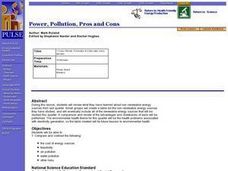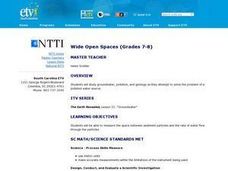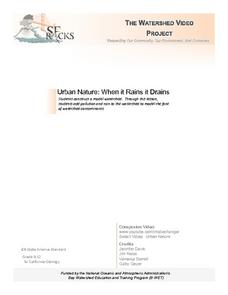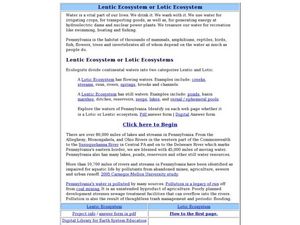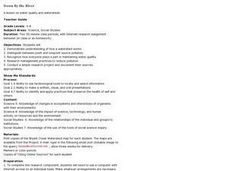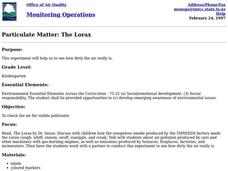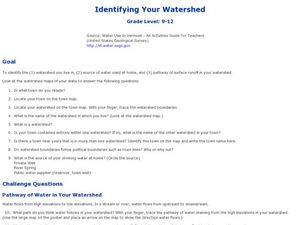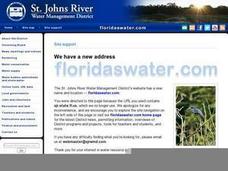Curated OER
Power, Pollution, Pros and Cons
Students review what they know about non-renewable energy, compare and contrast advantages and drawbacks of each type, such as cost of energy sources, feasibility, air pollution, water pollution, and other risks, and create table listing...
Curated OER
Water, Water, Everywhere (High School)
Students view different types of water to make the point that salt or polluted water isn't useful for drinking water. They chart causes, consequences and solutions to water scarcity based on internet research. They write an essay as...
Curated OER
Arsenic Contamination: Water Filtration
Students work in groups to design a filtration process that will separate clean water from polluted water. They organize data in tables or graphs and present their findings to the class. Students identify further safety protocols that...
Curated OER
TE Activity: Pollution Politics
Students examine how a bill becomes a law in the US Congress. They investigate legislation about global warming. They determine the role of engineers as they educate Congress, the public and other government institutions about global...
Curated OER
Not A Drop To Drink
Fifth graders discuss ways that humans pollute our natural water supply. They observe a video about water pollution. Students identify eight different ways water is contaminated. They investigate an oil spill by conducting a hands-on...
Curated OER
Wide Open Spaces
Learners examine the problem of groundwater pollution. In groups, they develop a solution to solve the problem of a local polluted water source. They also practice measuring the space between sediment particles and the rate of water flow.
Curated OER
When It Rains it Drains
Young scholars examine the major paths of water on the Earth's surface, and to investigate the many factors that contribute to those paths. Students demonstrate their understanding of a watershed by identifying the defining features of a...
Curated OER
"Water, Water Everywhere and None to Drink"
Ninth graders discover the importance of maintaining an unpolluted source of water for the city. They brainstorm ideas they can take to make their communitie's water better. They can also write letters to their local politicians for help.
Teach Engineering
Density and Miscibility
The liquids did not mix — so what do density columns have to do with it? The seventh part in a series of nine provides the theoretical explanation of why density columns do not mix. The lesson covers the topics related to mixing and...
Curated OER
Water Filtration
Students design a filtration system using three filtration materials. In this water filtration lesson, students conduct an experiment with their filtration systems. Students present their systems to the class. Group results are...
Curated OER
Lentic Ecosystem or Lotic Ecosystem
Students explore the differences between lentic and lotic ecosystems. For this ecology lesson students study the water systems in Pennsylvania.
Teach Engineering
Introduction to Environmental Engineering
A series on environmental engineering introduces the class to issues that environmental engineers work to solve. This first instructional activity focuses on air and land issues, and looks at ways to reduce pollution.
Curated OER
"Water, Water Everywhere and None to Drink"
Ninth graders research the importance of maintaining an unpolluted source of water in their community. They brainstorm ideas on what they can do to help the problem. They can also write letters to their local politicians for help.
Curated OER
Down By the River
Students examine how watersheds work and determine the difference between point and nonpoint source pollution. They research management practices to reduce pollution and investigate how everyone can participate in reducing water pollution.
Curated OER
Particulate Matter: The Lorax
Students explore air pollution. In this ecology lesson, students participate in an experiment in which 5 numbered jar lids are placed outside. Students bring one lid a day in until all jars are inside. Dirt specks are counted, observed,...
Curated OER
Oil on the Beach
Students explore how oil pollutes the oceans. For this science lesson, students investigate various materials that could be used to clean up an oil spill. Students discuss which materials worked best and how humans can reduce oil spills.
Curated OER
Identifying Your Watershed
Students identify the watershed where they live and how it is related to their own water consumption. In this watershed lesson students locate their watershed on their town map. The students find the source of their water that they use...
Curated OER
Water Purification
Students develop an understanding and appreciation of water purification techniques and their implications for health maintenance.
California Academy of Science
Pollution in Our Watershed
The concept of a how pesticides and other chemicals pass through a watershed can be difficult for younger learners to grasp without a concrete example. In the activity here, some blank paper, markers, and a spray bottle are all you need...
Curated OER
Erosion
Young scientists identify erosion, explain the causes of erosion, and name some techniques that can slow the process of erosion. Learners are divided up into groups of four and perform a simulation of soil erosion in class. The...
Curated OER
Got Water?
Students determine that delivering clean, fresh water to citizens around the world involves and affects politics, economics, international relations, and technology. They brainstorm a list of factors that might affect their town's...
Curated OER
Lesson 11 - Potable Water
Students investigate the meaning of potable water and water reuse. They define water quality and quantity problems. They complete worksheets, a quiz and design a poster.
Curated OER
Junior Engineering Surface Water
Students experience the effects of pollution and erosion on a model of a watershed and explore ways to change the outcome.


